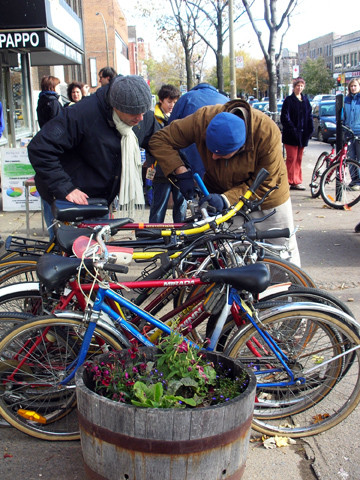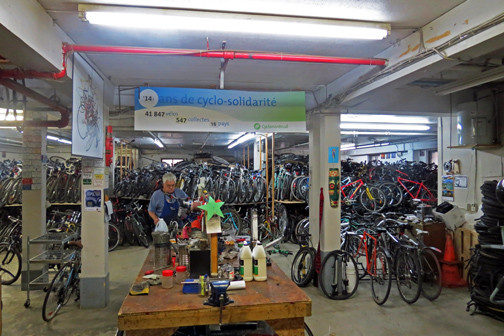Empowered on Two Wheels
Montreal Non-Profit Improving Lives Through Cycling
Growing up in New York City’s Staten Island, Glenn Rubenstein lived just moments away from the Fresh Kills Landfill, one of the country’s largest garbage dumps—covering just over 2,000 acres.
Today, Rubenstein intertwines his passion for environmental issues with his penchant for cycling, working as the development coordinator for Montreal based Cyclo Nord-Sud, a non-profit organization. Cyclo Nord-Sud collects used bicycles from around the province, stores them in a warehouse on St. Urbain Street and eventually ships them to underdeveloped Southern countries such as Haiti, Ghana and Nicaragua.
Living so close to the landfill got a teenage Rubenstein thinking about the political and environmental issues surrounding New York in the ‘70s, especially about air pollution, an issue he describes today as being so bad that New Yorkers themselves simply try not to think about the real consequences tied to it.
“We all have experiences that in some way enrich our viewpoint on different public policy issues,” he says. “That garbage dump really marks you, not only the pollution that emanates from it but you begin to think about issues like overconsumption and why things aren’t being reused.”
“You can imagine the difference it can make, going from only having your two feet to get around, to having a bike.”
—Community Engagement Coordinator, Claude Beauséjour
And so began his interest in environmentally conscious transportation, more specifically using a bicycle to get around instead of a car. Years later, while doing environmental policy work for the New York City Council, Rubenstein’s values and beliefs resurfaced after Americans celebrated the First Gulf War as a victory in the early ‘90s.
He admits to being turned off by the connection the war had to the American automobile industry and oil prices—quitting his job at city council and beginning what has now been a more than 20-year-long career in activist groups.
“Americans’ use of private automobiles was both a cause and a justification for killing people,” he says. “That’s when I started becoming pretty radical about cyclo-transportation issues.”
With high gas prices driving the price of public transport in many of the areas the organization exports to, and the dimensions of bus routes restricted by the quality of roads, many times the bicycle can represent the only realistic mode of transportation for many.
In several cases these bikes are shared between an entire family, parents use them to find employment in places they otherwise wouldn’t be able to reach; they allow children to access education at schools that wouldn’t be attainable by foot.
Rubenstein tells the story of a family in Nicaragua whose day-to-day life has been turned around by the addition of a bike. The time the father saves by using his new bike to get to work allows him to drop off his children at school in the morning; the money he saves from not using public transportation allows him to afford his children’s education.

Cyclo-Nord-Sud’s Community Engagement Coordinator, Claude Beauséjour, went to Haiti last spring to see the results herself.
“It’s so touching to see the impact, to see the smiles when they’re using their bikes,” she says.
“You can imagine the difference it can make, going from only having your two feet to get around, to having a bike.”
Cyclo Nord-Sud humbly started to come together in 1998 and had already shipped 846 bikes to needy areas only two years later. Last year, with the help of more than 500 volunteers, it shipped 3980 bikes, separated into nine different containers and collected over the course of the year through 56 different bicycle drives held all across Quebec.
This Sunday, a dozen Cyclo Nord-Sud volunteers will be holding a used bike collection at Co-op la Maison Verte in Notre-Dame-de-Grâce, asking for people to drop off their used bicycles or parts. Each donor is asked to give $15 per bike contributed, with tax receipts for the donation being handed out on the spot.
The majority of the bikes collected Sunday will be heading directly to Haiti, going towards a special school project currently in the works that would provide an entire school staff and students with bicycles.
Simultaneously, another dozen volunteers will be giving up their Sunday morning over at the warehouse on St. Urbain Street, packing upwards of 400 bikes in a container being shipped off to Nicaragua next week.
“That’s the concrete part of the job,” says Beauséjour, referring to the work needed to be done this Sunday. “It’s all about solidarity, we know the hard work we do here is being mirrored in the communities we work with.”
Cyclo Nord-Sud Pick-Up / Oct. 20 / Co-op la Maison Verte (5785 Sherbrooke St. W.) / 10 a.m. to 2 p.m.



1_600_375_90_s_c1.jpg)

